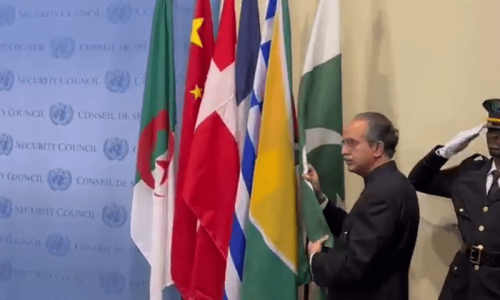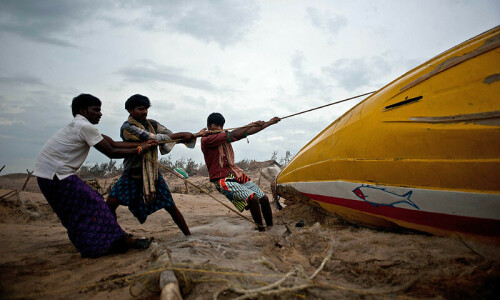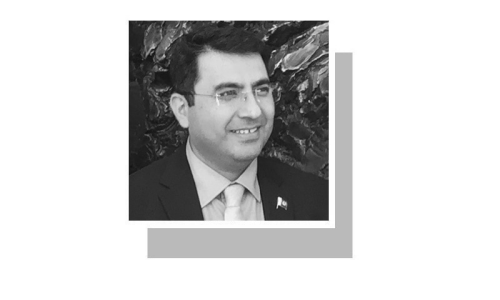ISLAMABAD: Parliamentarians and civil society activists gathered at the Pakistan Institute of Parliamentary Services (Pips) on Tuesday to mark the end of 16 Days of Activism Against Gender-Based Violence. The Pakistan Poverty Alleviation Fund (PPAF) also hosted a separate event.
The event at Pips was arranged in collaboration with Oxfam, the Women’s Parliamentary Caucus and Bedari.
Civil society representatives talked about the various forms of gender-based violence and said laws against such violence were present but needed to be implemented.
They highlighted lacunas in the existing laws and urged parliamentarians to play their role in improving them.
The parliamentarians, who were attending the event, said they had come a long way in regards to women protection laws with the help of the civil society and stressed on the need for raising awareness about the issue.
According to a presentation by Bedari, 45.8pc of women in Pakistan are literate compared to 69.5pc men, only 2pc of women in the country own land, 13 million are in low-paid, unskilled and blue collar work and between 70 and 90pc have suffered some form of abuse.
Events across the city mark the end of 16 Days of Activism Against Gender-Based Violence
An estimated 5,000 women are killed every year in domestic violence related cases and a rape happens every two hours in Pakistan, participants were told.
Acid Survivor Foundation Executive Director Valarie Khan said Pakistan is the only country where acid attacks have decreased by 50pc over the last 10 years. She urged policy makers to pursue legislation against child marriages to protect young girls and their right to education and health.
“Vote, lobby, fight or call up your senators, quote the Constitution, give arguments from religion to make sure child marriages are outlawed in all provinces of Pakistan,” Ms Khan said.
“If the law does not consider someone under the age of 18 mature enough to cast a vote, drive a car or even purchase a SIM card, they cannot be considered mature enough to bear the responsibilities of marriage,” said Senator Sehar Kamran.
Strengthening Participatory Organisation CEO Saleem Malik said laws are not enough to protect women against domestic violence but it is a first step. He criticised the Khyber Pakhtunkhwa government for not having a domestic violence law yet.
KP MPA Dina Naaz said the religious lobby is very strong in the KP assembly which is causing delays.
“But despite strong resistance, women parliamentarians from KP have fought for this bill and we promise those sitting here today that the bill will be passed in five months remaining,” she said.
Experts from various prominent organisations participated in a panel discussion at the PPAF event and talked about how to drive action in Pakistan on fifth Sustainable Development Goal which is to achieve gender equality and empower all women and girls.
PPAF has been hosting 16 days of Activism Against Gender-based Violence for four years and the organisation has come up with various methods for raising awareness and support for gender equality and engaging people to talk about the harmful effects of violence against women and children.
The panelists included Simi Kamal who is senior group head grants and operations at PPAF, Farmers Development Organisation Executive Director Ghulam Mustafa, Unicef Child Protection Specialist Muqadissa Mehreen and PTV’s Azhar Hafeez.
Mr Mustafa said more needs to be done to ensure gender equality and raising awareness about the issue.
He applauded the efforts of legislators for passing laws against domestic violence and said it needs to be ensured that the bill is implemented.
Ms Mehreen quoted a 2015 report which valued the unpaid work women do globally at $10 trillion and called for more recognition for unpaid women, adding that 78pc of women in Pakistan do not work.
She urged government and non-government organisations to invest in the economic empowerment of women and to establish vocational training centres for them.
Simi Kamal, who chaired the discussion, said not all the provinces have formulated and made laws for the protection of women and urged legislators to play their due roles in supporting and enacting such laws.
Mr Mustafa said it is very disturbing to see 12 million women are not registered as voters, which should be an eye-opener for activists and government and non-government organisations.
Published in Dawn, December 13th, 2017













































Dear visitor, the comments section is undergoing an overhaul and will return soon.